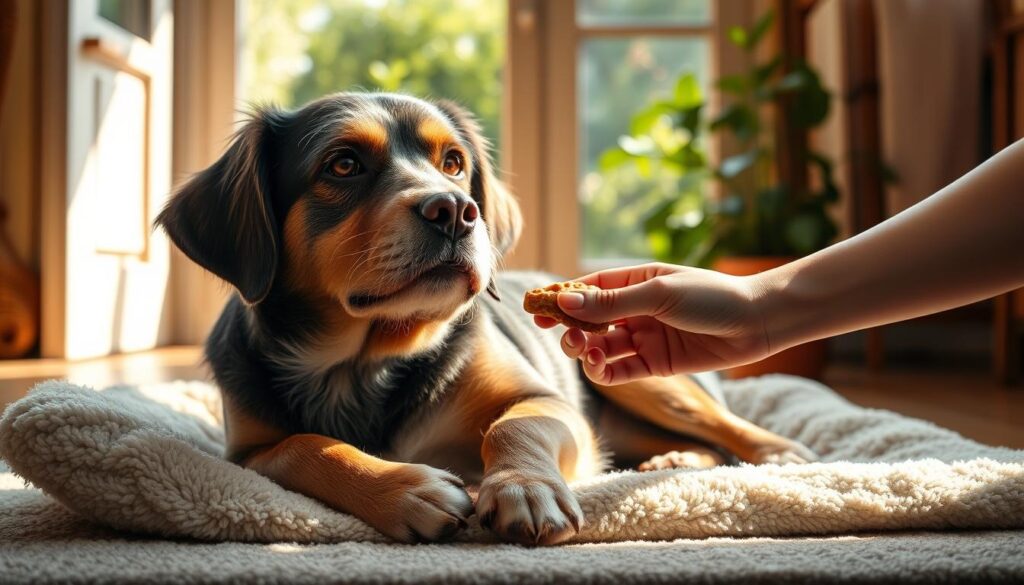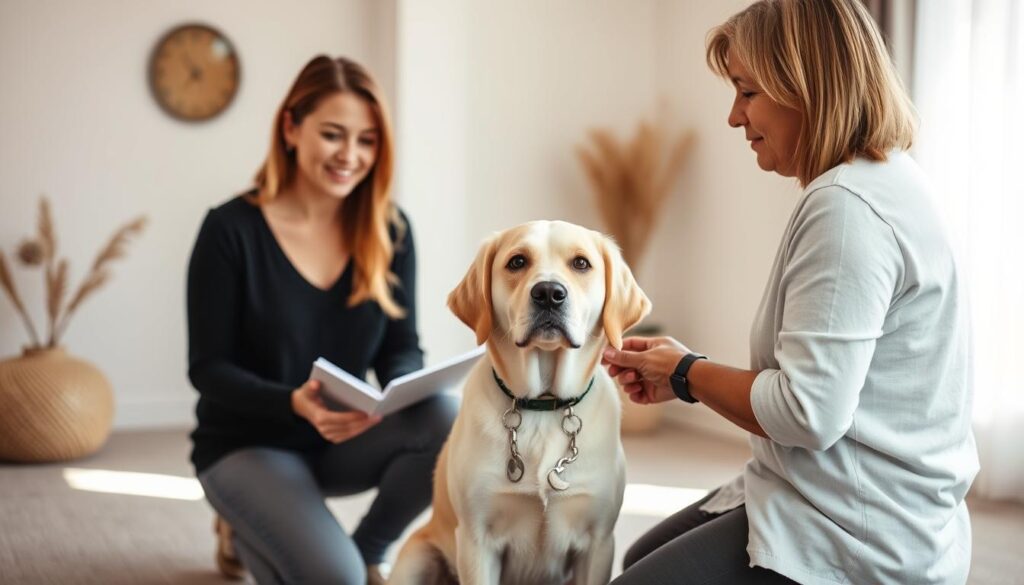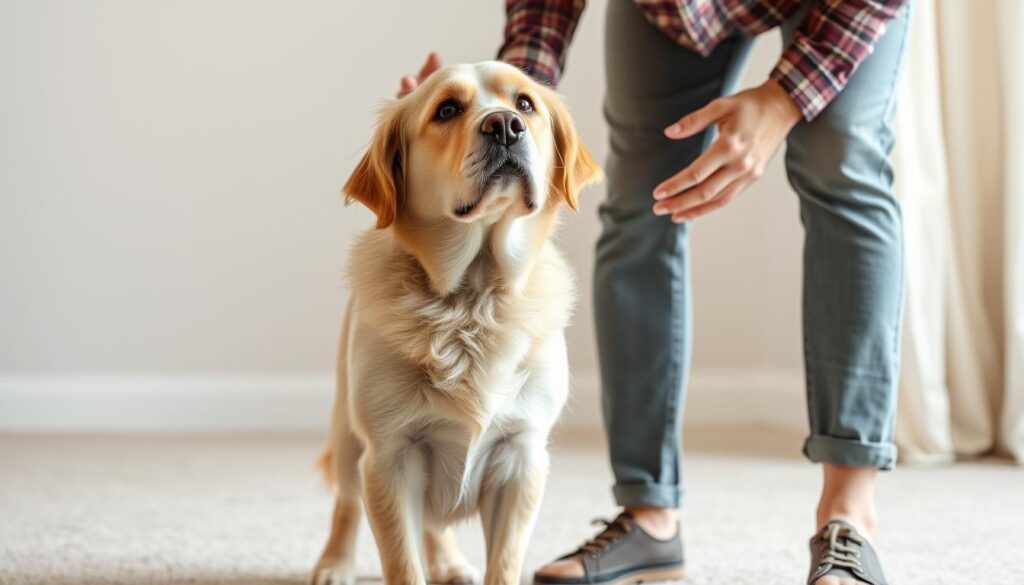Table of Contents
How to Potty Train an Older Dog
Every dog owner faces the challenge of potty training, especially with older dogs. It’s not just about teaching new tricks. It’s about understanding their unique needs, physical limitations, and emotional journey.
Learning to potty train an older dog takes more patience and compassion than training a puppy. Your senior dog might face physical changes, cognitive shifts, or habits that make training hard.
Potty training for senior dogs is not a punishment. It’s a way to improve communication and understanding. Each small success celebrates your bond, showing that learning has no age limit.
Key Takeaways
- Senior dogs require unique potty training approaches
- Patience and consistency are crucial
- Understanding underlying health issues is important
- Positive reinforcement works best
- Every dog can learn with the right technique
Understanding the Reasons for Potty Issues in Older Dogs
Training older dogs to use the bathroom can be tricky. As they get older, many things can cause accidents and changes in their habits. Knowing why these changes happen is key to training them well.
Common Causes of Incontinence
Incontinence in older dogs can come from many places. To start training, you need to look at possible health problems:
- Weakened bladder muscles that reduce control
- Hormonal imbalances affecting urinary function
- Neurological changes impacting bladder management
Behavioral Factors to Consider
Your dog’s past and current environment matter a lot for their potty habits. Older dogs might face:
- Previous inconsistent training
- Anxiety from household changes
- Reduced ability to communicate bathroom needs
Health Issues that May Affect Potty Habits
Many health problems can mess with your dog’s bathroom routine. Some big health concerns include:
- Urinary tract infections
- Kidney disease
- Cognitive decline
- Diabetes
Understanding these challenges is the first step in successful potty training for older dogs.
Preparing Your Home for Potty Training
Housebreaking an older dog needs careful planning. The right environment is key for success, especially with mature dogs. They often have habits to break.
https://www.youtube.com/watch?v=8BCscz9QtgQ
Your home setup is crucial for training older dogs. Here are some tips to create the best potty training space:
Designating a Potty Area
Finding the right potty spot is vital. Think about these important points:
- Choose a consistent, easily accessible outdoor area
- Select a spot with minimal distractions
- Ensure the area has good drainage
- Protect the space from extreme weather conditions
Choosing the Right Supplies
Get the right tools for training older dogs:
| Supply | Purpose | Recommended Type |
|---|---|---|
| Enzymatic Cleaner | Eliminate odors | Pet-specific formulas |
| Puppy Pads | Indoor accident protection | Absorbent, leak-proof pads |
| Treats | Positive reinforcement | Small, low-calorie rewards |
Creating a Consistent Routine
Having a set schedule is key for housebreaking an older dog. Consistency helps your dog understand expectations and reduces confusion. Focus on:
- Regular feeding times
- Scheduled bathroom breaks
- Immediate outdoor trips after meals
- Consistent praise and rewards
By following these tips, you’ll make a great environment for potty training your older dog.
Establishing a Potty Training Schedule
Teaching older dogs to go outside needs patience and a smart plan. Senior dog potty training advice says a consistent schedule is key. It should fit your dog’s needs and physical limits.
Creating a good potty training routine for older dogs means knowing their needs. Then, adjust your plan to fit them.
How Often to Take Your Dog Out
How often to take your dog out depends on several things:
- Age of your senior dog
- Overall health condition
- Mobility limitations
- Previous potty training history
Recognizing Bathroom Signals
Knowing when your senior dog needs to go outside is key. Look for these signs:
- Restless pacing
- Whining or unusual vocalization
- Circling in one spot
- Standing near the door
- Sudden changes in behavior
“Consistency is key when teaching older dogs new bathroom habits.” – Professional Dog Trainer
Timing is Everything
Senior dogs do best with a set bathroom schedule. Recommended timing includes:
- Immediately after waking up
- 15-30 minutes following meals
- Before bedtime
- Every 2-3 hours during the day
Senior dogs may have less bladder control. So, be patient and supportive. Your consistent effort will help your older dog learn new bathroom habits.
Positive Reinforcement Techniques
House training a senior dog needs patience and kindness. Positive reinforcement is the best way to help older dogs learn. It makes them feel good about doing the right thing.

Learning to potty train an older dog is all about positive reinforcement. Older dogs might face special challenges. So, it’s important to be supportive.
Utilizing Treats and Praise
Good rewards can really help your dog’s potty training:
- Choose high-value treats your dog loves
- Offer immediate rewards right after successful potty breaks
- Use enthusiastic verbal praise with a happy tone
- Keep treats small and easy to consume quickly
Avoiding Punishment
Punishment can make your dog anxious and slow down training. Instead, use positive reinforcement. Your dog wants to please you, and knowing this strengthens your bond.
Building Trust Through Consistency
Consistency is crucial for teaching an older dog new habits. Make a routine that your dog can count on. This makes them feel safe and helps them learn faster.
Gradual Adjustment to New Habits
Potty training for senior dogs needs patience and a smart plan. Older dogs might learn slower, but with steady help, you can change their habits.
The secret to training older dogs is knowing their special challenges. Then, adjust your training to fit their needs.
Introducing New Potty Locations
Changing your dog’s potty spot? Here’s what to do:
- Begin with familiar smells near the new spot
- Give treats when they use it right
- Slowly cut off old potty spots
Dealing with Setbacks
“Patience is not the ability to wait, but the ability to keep a good attitude while waiting.” – Joyce Meyer
Setbacks happen in potty training for senior dogs. Keep track of their progress:
| Behavior | Tracking Method | Frequency |
|---|---|---|
| Successful Potty Trips | Daily Log | Every Outing |
| Accidents | Incident Report | When Occurred |
| Progress Milestones | Weekly Review | Every 7 Days |
Tips for a Smooth Transition
For successful housetraining of older dogs, try these tips:
- Keep a regular schedule
- Use high-value treats to motivate
- Clean up accidents well to stop them from happening again
- Be kind and don’t scold
Remember, every senior dog is different. Tailor your training to their special needs and abilities.
Monitoring Your Dog’s Progress
Training older dogs needs patience and watching closely. It helps you see how they learn and change your training plan.
Housebreaking older dogs needs a careful plan to track progress. Keeping a detailed journal can give you key insights into your dog’s bathroom habits.
Creating a Potty Training Journal
Your journal should track important details about your dog’s bathroom habits:
- Time of day when accidents occur
- Successful outdoor bathroom breaks
- Frequency of urination and defecation
- Water intake and meal times
Recognizing Important Milestones
Celebrate small wins in your training. Key milestones include:
- First full day without indoor accidents
- Consistent signaling to go outside
- Longer periods between bathroom breaks
- Increased bladder control
Adjusting Your Training Schedule
Flexibility is crucial when training mature dogs. Your journal will show patterns and help you adjust your training. Listen to your dog’s signals and change your schedule to help them learn.
Every dog learns in their own way. Be patient, consistent, and watch closely to successfully housebreak an older dog.
Dealing with Accidents
Potty training older dogs can be tough, and accidents happen. It’s important to stay calm and patient when accidents occur. Senior dog potty training advice says to be supportive and understanding.
How to Handle Indoor Accidents
When an accident happens, how you react is crucial. Here are steps to handle indoor accidents well:
- Stay calm and avoid scolding your dog
- Interrupt the accident if possible and immediately take your dog outside
- Never punish your dog for accidents after the fact
- Assess potential underlying causes of the accident
Cleaning Tips for Stains and Odors
Cleaning up properly is key to avoiding future accidents. Use these tips for a thorough clean:
- Use enzymatic cleaners specifically designed for pet stains
- Blot the area instead of rubbing to prevent spreading
- Clean the entire affected area thoroughly
- Neutralize odors to discourage future accidents
Understanding That Mistakes Happen
Remember, accidents are part of the learning process. Older dogs might need more time to learn. Keep a positive attitude and keep training consistently. Every small step is a success in training older dogs.
Patience and consistency are your greatest tools in senior dog potty training.
Seeking Professional Help

Teaching older dogs to go outside can be tough when problems keep coming up. Getting help from a pro is key to solving these issues.
Dealing with potty training for an older dog needs an expert’s touch. Knowing when to ask for help can greatly improve your dog’s bathroom habits and health.
When to Consult a Veterinarian
Your senior dog might need a vet if you see:
- Sudden changes in bathroom habits
- Frequent accidents inside the house
- Signs of discomfort during urination
- Unusual frequency of bathroom visits
Medical conditions can greatly affect a dog’s ability to control bathroom needs. A vet can check for health issues that might be causing house training problems.
Finding the Right Dog Trainer
Looking for a pro to help with house training a senior dog? Here’s what to look for:
- Experience with senior dog training
- Positive reinforcement techniques
- Specialized knowledge in geriatric dog behavior
- References from previous clients
Benefits of Professional Guidance
Professional trainers create custom plans for teaching older dogs to go outside. They offer strategies that fit your dog’s needs and provide ongoing support.
Professional help isn’t a sign of failure—it’s a proactive approach to solving complex training challenges.
Every senior dog is different. Professional guidance can give the unique support needed to overcome potty training hurdles.
Maintaining a Long-Term Potty Routine
Potty training an older dog needs your ongoing effort and understanding. Learning how to potty train an older dog shows that being consistent is crucial. Your patience will help your dog get used to new bathroom habits, even with age and physical challenges.
As your dog gets older, potty training becomes more complex. You might need to change your routine for their decreased mobility or more frequent needs. Regular vet visits can spot health issues that affect their bathroom habits.
Positive reinforcement is key throughout your dog’s life. Keep using treats, praise, and gentle guidance to keep good potty habits. Changes in environment, like moving or traveling, can upset their routine. Stay calm and offer extra support to prevent them from slipping back.
Being adaptable is vital when dealing with older dogs. Be ready to adjust your training as your pet’s abilities change. With understanding and consistent training, your senior dog can keep up good bathroom habits and live a comfortable, dignified life.
FAQ
Is it possible to potty train an older dog?
Yes, you can potty train an older dog. It might take more time and effort than with a puppy. But, with the right approach and patience, older dogs can learn new habits.
Understanding their needs and health is key. Using positive reinforcement methods also helps a lot.
How long does potty training take for an older dog?
The time it takes to potty train an older dog varies. It depends on their age, health, and past experiences. Some dogs might learn quickly, while others might take longer.
Being consistent and patient is crucial. Remember, it’s a journey that requires time and a positive attitude.
What are common reasons older dogs have potty issues?
Older dogs may have potty problems for several reasons. Weakened bladder muscles and hormonal imbalances are common. So are urinary tract infections, kidney disease, and cognitive decline.
Medical conditions, anxiety, and changes in their environment can also cause issues.
How often should I take my older dog out to prevent accidents?
How often to take your dog out depends on their age and health. Older dogs often need more frequent bathroom breaks. They might need to go every 2-4 hours during the day.
Watch for signs they need to go. Take them out after meals, naps, and before bedtime. Adjust the schedule as needed based on their progress.
What supplies do I need for potty training an older dog?
You’ll need puppy pads, enzymatic cleaners, treats, a designated potty area, and cleaning supplies. Enzymatic cleaners are key for removing odors. Choose small, motivating treats for your dog.
Should I punish my dog for indoor accidents?
No, punishing your dog is not helpful. It can make them anxious and worsen the problem. Instead, use positive reinforcement like treats and praise.
If they have an accident, clean it up without scolding. Focus on rewarding good behavior and creating a supportive environment.
When should I consult a veterinarian about potty training?
See a vet if your dog’s bathroom habits change suddenly or if they have frequent accidents. Also, if they show signs of discomfort, blood in urine, or can’t control their bladder. These could be signs of health issues that need medical attention.
Can health issues impact potty training in older dogs?
Yes, health problems can affect a dog’s ability to control their bladder. Issues like urinary tract infections, kidney disease, and hormonal imbalances can make potty training harder. Medical treatments or management strategies may help.
How can I make potty training less stressful for my older dog?
To reduce stress, keep a consistent routine and use positive reinforcement. Create a calm environment and be patient. Use familiar scents or surfaces and praise your dog often.
Gradually introduce new potty locations. Give your dog time to adjust to the new routine.
What if my older dog has never been properly house trained?
It’s never too late to teach an older dog to use the bathroom outside. Start fresh, use positive reinforcement, and be consistent. Break training into small steps.
If you face challenges, consider getting help from a professional dog trainer. They have experience with older dogs.
There are no reviews yet. Be the first one to write one.

